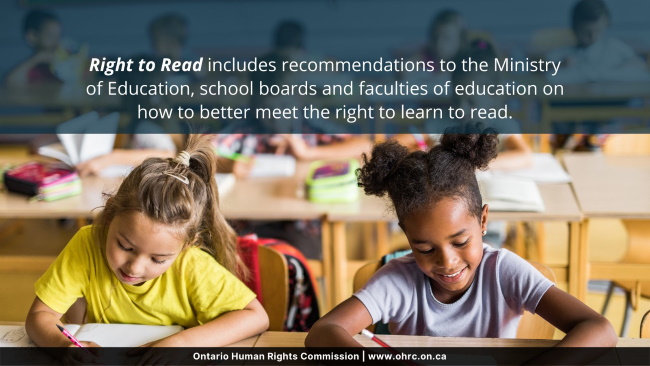
Right to Read Inquiry Calls for Critical Changes to Ontario’s Approach to Early Reading
February 28, 2022
The Ontario Human Rights Commission (OHRC) today released its report on human rights issues affecting students with reading disabilities, calling for critical changes to Ontario’s approach to early reading, in areas such as curriculum and instruction, screening, reading interventions, accommodations and professional assessments.
- Executive summary
- Full report
- OHRC recommendations to meet the right to learn to read
- News release
- Backgrounder
- Community support
- Right to Read inquiry video
Launched in 2019, the Right to Read inquiry looked into whether students with reading disabilities have meaningful access to education as required under the Ontario Human Rights Code. The inquiry looked into five key requirements that are essential to successfully teach and support students to read:
- Curriculum and instruction: Whether Ontario curriculum, teacher education programs and school board approaches to teaching reading reflect evidence-based approaches and are supported by scientific research.
- Early screening: Whether all students are being screened for reading difficulties in Kindergarten (or in Grade 1, where a child does not attend public school for Kindergarten) using scientific evidence-based early screening tools.
- Reading interventions: Whether students who have been identified as having reading difficulties through universal early screening or psychoeducational assessment have access to timely, scientific evidence-based reading interventions.
- Accommodation: Whether students with reading difficulties have access to timely and effective accommodation and assistive technology.
- Professional assessments: Whether students have access to timely and appropriate assessments where needed.
Right to Read includes over 150 recommendations to the Ministry of Education, school boards and faculties of education on how to address systemic issues that affect the right to learn to read, including:
- Adopting a new Kindergarten Program and Grades 1 to 8 Language curriculum that features direct and systematic instruction in foundational reading skills, and preparing current and future teachers on evidence-based approaches to teaching students to read
- Screening every student, at least twice a year from Kindergarten to Grade 2, to identify students at risk for reading difficulties, using standardized, evidence-based screening tools
- Standardizing and providing stable funding for evidence-based reading interventions
- Making access to interventions equitable for all students
- Providing and supporting timely and effective accommodation, including greater access to evidence-based software and assistive technology
- Improving access to professional assessments and ensuring greater consistency and transparency in the assessment process
- Setting clear and consistent standards for school boards and mandating better data collection, analysis and reporting
- Improving communication with students and parents
- Working with experts in the science of reading to implement the OHRC’s recommendations.
3 replies on “Right to Read Inquiry Calls for Critical Changes to Ontario’s Approach to Early Reading”
Thank you for covering the Right to Read report so well! Many parents and teachers are interested in learning more. Keep up your great coverage as recommendations are implemented! The library is a great resource for all to access new books on Structured Literacy and the Science of Reading.
This comes as a piece of welcome good news in a time when good news is hard to come by.
Is there anything we can do to make sure this is implemented in a timely and effective way? This is a great start but my faith in the Ford government is shaky.
I hope public libraries will help be the bridge that the school system needs by providing evidence based resources for children with LDS , Orton Gillingham Manual, Decodable readers and hosting reading specialists and interventionists .